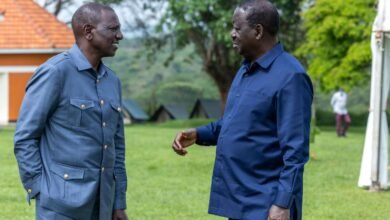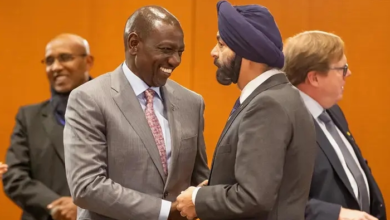
Dr. William Kipchirchir Ruto has been announced the president-elect ending a six-day-long wait among over 50 million Kenyans.
The Independent Electoral and Boundaries Commission (IEBC) Chairperson Wafula Chebukati confirmed Ruto as the president-elect after garnering 7,176,141 votes. This is 50.49 per cent of the total votes cast.
Azimio La Umoja leader Raila Odinga got 6,942,930, a 48.88 percent representation of total voter turn out.
During the declaration, however, the national tallying centre turned into a chaotic scene with a numbe of politicians enaging into fist fight over an alleged bangled election.
Four of IEBC commissioner failed to show up at Bomas. They were IEBC commissioners – vice chair Juliana Cherera, commissioners Francis Wanderi, Irene Masit and Justus Nyang’aya – who have alleged that the results were arrived at in an opaque manner, without giving further details.
“We are not at Bomas because we cannot take ownership of the results that are going to be announced,” Cherera said.
Despite the unfortunate incident, Ruto makes history to become the first and only president to succeed a Kenyan President through an election.
He had a falling out with the outgoing President Uhuru Kenyatta in the second term of the Jubilee administration.
The two ran on a joint ticket in 2013 in what would later turn out as an endearing bromance and a solid brotherhood. They termed the union as a unity for the whole nation at a time when they were facing crime charges against humanity at the International Criminal Court (ICC).
Their re-election into office was, however, followed by an annulment by the Supreme Court which ordered a re-run after it nullified the 2017 General Election.
Things fell apart following a grand handshake between the outgoing President Kenyatta and his rival-turned-protege, Raila Odinga in March 2018.
Ruto was the first Kenyan to serve as the Deputy President after the promulgation of the 2010 Constitution.
Before then, Kenya had president’s surrogates who served as Vice Presidents who were hired and fired at the President’s will. Some of these leaders attempted to run for office but failed.
Musalia Mudavadi
Mudavadi served Kenya as the seventh Vice President under the government of the late President Mwai Kibaki.
He held the position from November 4, 2002 to January 3, 2003. In the Grand Coalition government under Kibaki, Mudavadi was appointed the Deputy Prime Minister from 2008–2012 May when he resigned officially to launch his 2013 presidential bid.
Mudavadi played a grand role in the Kenya Kwanza coalition in which his party, Amani National Congress (ANC) was among the chief principals.
George Saitoti
Saitoti served Kenya as longest Vice President in the Mzee Daniel arap Moi’s government from 1989 to 1999.
He served as Kenya’s security minister and was a presidential candidate in the 2013 General Election before died in a plane crash.





